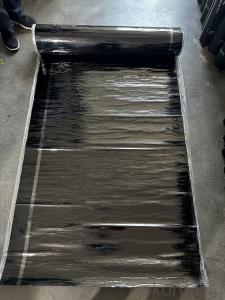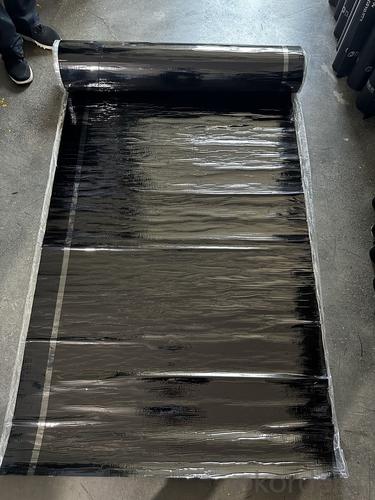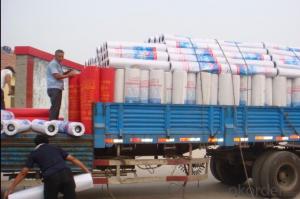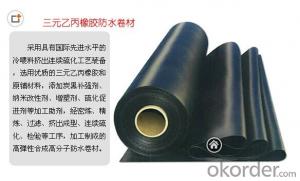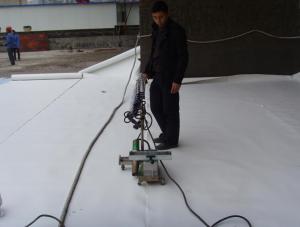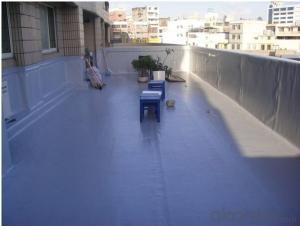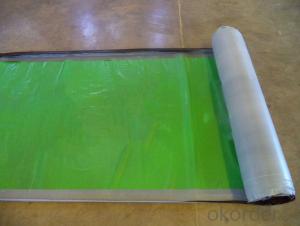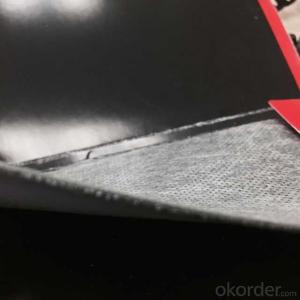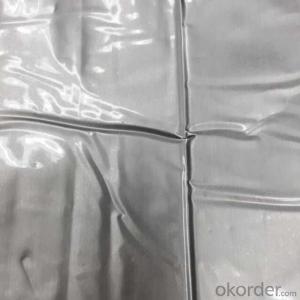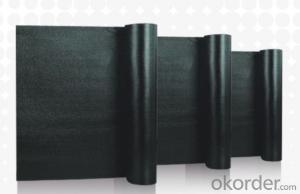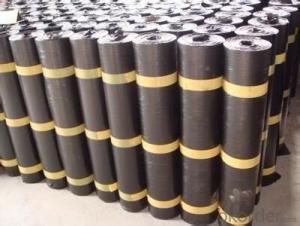Strong cross-membrane reaction type self-adhesive waterproof membrane
- Loading Port:
- China main port
- Payment Terms:
- TT OR LC
- Min Order Qty:
- 10 m²
- Supply Capability:
- 80000 m²/month
OKorder Service Pledge
OKorder Financial Service
You Might Also Like
Specification
01 Product introduction Product Introduction
Strong cross-film reactive self-adhesive waterproof coil is a kind of high performance, cold construction reactive bond waterproof coil made of special cross-layer high density polyethylene (HDPE) strong film and high quality polymer reactive binder by special process composite. It has super bonding performance with concrete, high porosity sealing, excellent dimensional stability. Uv resistance and tear resistance. The strong cross-film of the product is a high-strength HDPE film formed by cross-lamination process. The longitudinal and horizontal elongation of the film film made by this process is the same, and the roll will not be deformed, which is more beautiful and waterproof effect is more reliable. The high-quality pressure-sensitive adhesive layer can be quickly combined with the concrete base. Its excellent self-healing properties and local self-locking water properties greatly reduce the penetration probability. The polymer in the strong film reacts with the cement compound in a series of reactions, forming an interpenetrating network structure, and finally forming a continuous mechanical bond, which is permanently sealed on the cement cementitious material member.
02 Product characteristics
1. The polyester strong film has higher tearing strength and dimensional stability, which solves the phenomenon that the tire free self-adhesive polymer waterproof coil is easy to wrinkle after construction;
2. Has excellent bonding performance, and the structure to achieve full bonding, to achieve the best waterproof effect of the coil and the structure layer, and effectively prevent water channeling phenomenon;
3. Highly featured self-healing function, which can make local damaged points heal themselves;
4. Excellent high and low temperature resistance, can adapt to climate change;
5. Excellent extensibility and tensile properties, greatly adapt to the deformation of the structure base;
6. Leading construction technology, can use hot paving, dry paving, wet paving and pre-paving construction, wet base can be used, improve the construction conditions in different environments, while saving time;
7. No pollution, energy saving, safety and environmental protection.
03 Applicable scope
1. Underground engineering, underground garage roof, planting roof, roof garden;
2. Subway, tunnel engineering, pool, roof engineering;
3. Waterproof with corrosion and large deformation of structure;
4. Other warehouses and workshops with high requirements for waterproof and moisture-proof.
04 Packaging and storage andtransportation
1. When storing and transporting, different types and specifications of products should be stacked separately and should not be mixed. Avoid sun and rain, pay attention to ventilation, away from fire.
2. The storage temperature should not be higher than 45℃, the horizontal storage of the coil shall not exceed 5 layers, and the vertical storage shall be stacked in a single layer.
3. Prevent tilt or side pressure during transportation, and cover the tarpaulin if necessary.
4. Under normal transportation and storage conditions, the storage period is 1 year from the date of production.
- Q: What is the meaning of the node and the additional layer in the construction of the membrane waterproofing layer?
- In general, these places are also the most vulnerable areas, need to focus on processing.
- Q: Does a waterproofing membrane require any special precautions during storage?
- Special precautions are necessary when storing a waterproofing membrane. To maintain its integrity and effectiveness, the membrane should be kept in a dry and cool area, shielded from direct sunlight and extreme temperatures. Moisture must be avoided, as exposure to water or high humidity levels can compromise its performance. Furthermore, the membrane should be stored upright, rather than stacked or folded, to prevent damage or deformation. It is also advisable to keep it away from sharp objects or any materials that may puncture or tear it. Adhering to these precautions will ensure the preservation of the waterproofing membrane during storage.
- Q: Can a waterproofing membrane be used in high-traffic areas, such as decks or balconies?
- Indeed, high-traffic areas such as decks or balconies can benefit from the utilization of a waterproofing membrane. These membranes are specifically engineered to act as a protective barrier against water and moisture, which makes them an optimal choice for areas that are frequently exposed to the elements. Due to their durability and ability to withstand foot traffic, they are well-suited for high-traffic regions. Decks and balconies, in particular, often employ these membranes in order to prevent water damage to the underlying structure and ensure the long-term structural integrity of the area. Moreover, certain waterproofing membranes are intentionally designed to be slip-resistant, thereby enhancing safety in high-traffic situations. In general, incorporating a waterproofing membrane into high-traffic areas serves as an effective method to safeguard and prolong the lifespan of these surfaces, while simultaneously preserving their functionality and aesthetics.
- Q: Are there any specific building code requirements for using a waterproofing membrane?
- Yes, there are specific building code requirements for using a waterproofing membrane. Building codes vary by jurisdiction, but most require that waterproofing membranes meet certain standards and be installed in accordance with manufacturer instructions. These codes often specify the type of membrane that should be used, the minimum thickness, and the method of installation. For example, the International Building Code (IBC) mandates that waterproofing membranes be listed and labeled by an approved testing agency. The code also requires that the membrane be installed in a manner that provides continuous protection and is capable of withstanding anticipated structural movements and environmental conditions. In addition to the type and installation requirements, building codes may also dictate the testing and inspection procedures for waterproofing membranes. This ensures that the membrane is properly installed and will effectively prevent moisture intrusion, protecting the building from potential damage and deterioration. It is important to consult the local building code or work with a qualified professional to determine the specific requirements for using a waterproofing membrane in a particular jurisdiction. Compliance with these requirements is crucial to ensure a safe and durable waterproofing system that meets the necessary standards.
- Q: How does a waterproofing membrane ensure a watertight seal around penetrations?
- By utilizing a waterproofing membrane, a watertight seal is established around penetrations, effectively obstructing water from infiltrating through these openings. Commonly composed of materials like rubber, PVC, or bitumen, which possess inherent water resistance properties, the membrane safeguards against water intrusion. Upon accurate application, the waterproofing membrane is encased around penetrations such as pipes, drains, or vents, forming a sealed layer that functions as a protective barricade. Typically, the membrane is affixed or mechanically fastened to the underlying surface, guaranteeing a secure and snug attachment. The membrane is deliberately engineered to exhibit flexibility, enabling it to adapt to the contours of the penetration. This adaptability guarantees the absence of any gaps or crevices through which water could potentially permeate. Furthermore, the membrane is often fortified with a layer of fabric or mesh, amplifying its durability and strength. In order to reinforce the watertight seal, specialized waterproofing accessories like collars, flanges, or boots are employed around the penetration. These accessories are specifically designed to snugly fit around the pipes or other protrusions, providing an additional layer of safeguarding against water infiltration. Ultimately, the implementation of a waterproofing membrane establishes a reliable barrier that thwarts water ingress through penetrations. It effectively seals off potential entry points, ensuring a watertight environment and preserving the underlying structure from water-related deterioration.
- Q: Can a waterproofing membrane be used in chemical or hazardous environments?
- Yes, a waterproofing membrane can be used in chemical or hazardous environments. Waterproofing membranes are designed to provide a barrier against water, moisture, and other liquids, which can also include chemicals and hazardous substances. These membranes are typically made of materials that are resistant to chemicals, such as polyurethane, PVC, or modified bitumen, to ensure they can withstand exposure to various chemicals without being damaged or compromised. However, it is important to select a waterproofing membrane specifically designed for chemical or hazardous environments to ensure it meets the necessary requirements and standards for such applications. Additionally, proper installation and maintenance are crucial to ensure the effectiveness and longevity of the waterproofing membrane in these environments.
- Q: Does a waterproofing membrane require any special considerations for installation in high-humidity areas?
- Yes, a waterproofing membrane does require special considerations for installation in high-humidity areas. High humidity can increase the moisture levels that the membrane is exposed to, potentially affecting its performance and durability. It is important to choose a membrane specifically designed for high-humidity environments and follow proper installation techniques to ensure effective moisture protection. Additionally, regular inspections and maintenance should be conducted to prevent any potential damage or deterioration caused by the high humidity.
- Q: Can a waterproofing membrane be used for parking garages?
- Yes, a waterproofing membrane can be used for parking garages. A waterproofing membrane is a protective layer that is applied on surfaces to prevent water penetration. In parking garages, it is essential to have effective waterproofing to protect the structure from water damage, such as corrosion of steel reinforcement and deterioration of concrete. Parking garages are exposed to various sources of water, including rain, snow, and vehicle fluids, which can seep through cracks and joints. A waterproofing membrane acts as a barrier, preventing water from infiltrating the structure and causing damage. There are different types of waterproofing membranes available for parking garages, including sheet membranes, liquid-applied membranes, and cementitious coatings. These membranes can be applied on horizontal and vertical surfaces, such as floors, walls, and ramps, to create a watertight seal. When selecting a waterproofing membrane for a parking garage, factors such as durability, flexibility, and resistance to chemicals should be considered. The membrane should be able to withstand the heavy loads and traffic conditions typically found in parking garages. Overall, using a waterproofing membrane in parking garages is crucial to protect the structure and extend its lifespan by preventing water-related damage. It helps maintain the structural integrity and aesthetics of the garage while ensuring a safe and functional environment for users.
- Q: Can a waterproofing membrane be used on below-grade walls?
- Yes, a waterproofing membrane can be used on below-grade walls to prevent water infiltration and moisture damage.
- Q: Can a waterproofing membrane be used for a planter box wall?
- Yes, a waterproofing membrane can be used for a planter box wall. A waterproofing membrane is designed to prevent water from penetrating through a surface, making it an ideal choice for a planter box wall where moisture is present. By applying a waterproofing membrane to the interior surface of the planter box, you can effectively protect the wall from moisture damage and prevent water from seeping into the surrounding soil. This can help extend the lifespan of the planter box and prevent any potential water damage to the surrounding area. However, it is important to ensure that the waterproofing membrane is compatible with the materials used in the planter box construction and follow the manufacturer's instructions for proper installation.
Send your message to us
Strong cross-membrane reaction type self-adhesive waterproof membrane
- Loading Port:
- China main port
- Payment Terms:
- TT OR LC
- Min Order Qty:
- 10 m²
- Supply Capability:
- 80000 m²/month
OKorder Service Pledge
OKorder Financial Service
Similar products
Hot products
Hot Searches
Related keywords
